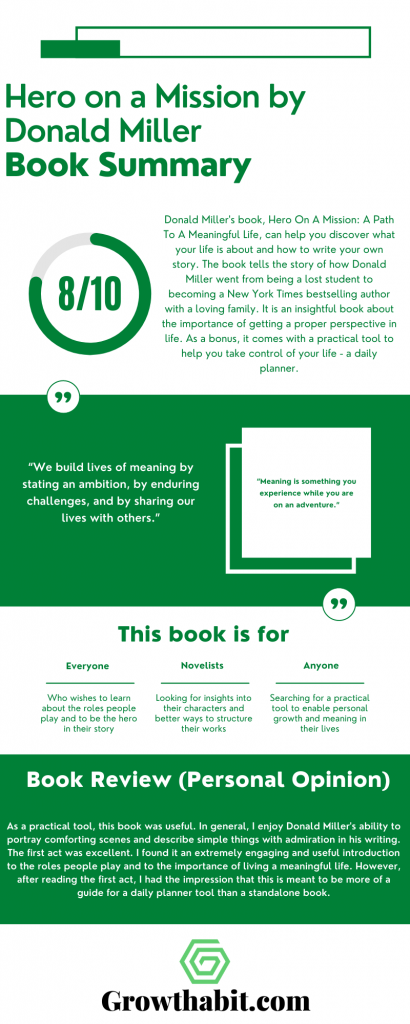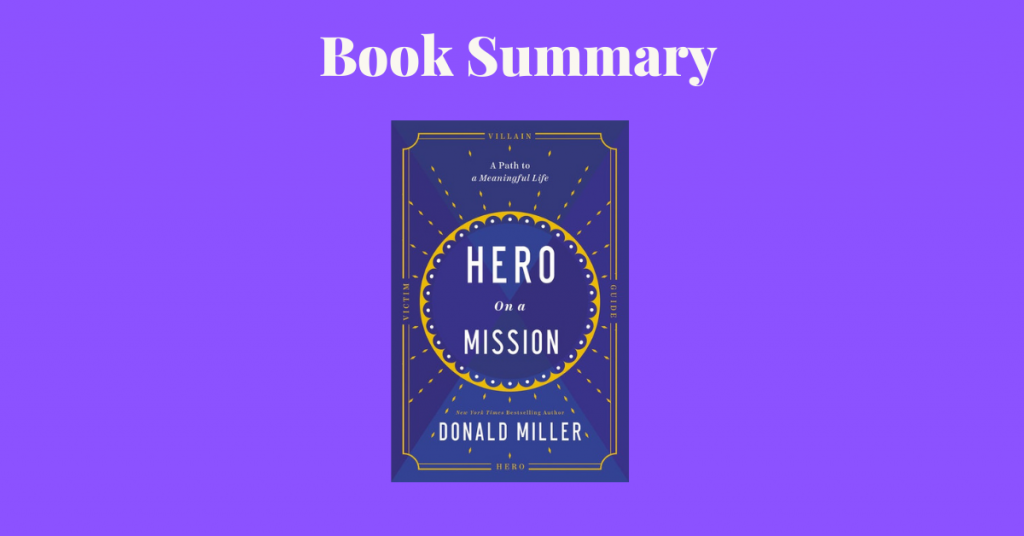Donald Miller’s book, Hero On A Mission: A Path To A Meaningful Life, can help you discover what your life is about and how to write your own story. The book tells the story of how Donald Miller went from being a lost student to becoming a New York Times bestselling author with a loving family. It is an insightful book about the importance of getting a proper perspective in life. As a bonus, it comes with a practical tool to help you take control of your life – a daily planner.
Book Title: Hero On A Mission: A Path To A Meaningful Life
Author: Donald Miller
Date of Reading: February 2022
Rating: 8/10
What Is Being Said In Detail:
Donald Miller wrote this book to share how his life transformed from a meaningless one without any purpose or direction, to a structured and meaningful journey to reaching his goals. His understanding of the purpose of this life and how to bond with family and dearest people was inspired by the experiences Victor Frankl had in concentration camps.
Throughout this book, Donald Miller’s life is described in a memoir manner, from his early years living on the couch in a shared apartment with other students and suffering from victim-villain swings, to starting his own successful company and writing books to encourage and guide others to become their own heroes. In addition, for writers searching for insights into storytelling, this book is full of insights into the roles people play.
This book also contains a guideline for an actual tool that Donald used for tracking his life story and setting and achieving goals for himself in many different areas. With the help of this sophisticated productivity tool, he produced exceptional results in his personal and business growth.
Introduction
Act 1: How to Create a Life of Meaning
In this chapter, Donald discusses four characters in every story: the victim, the villain, the hero, and the guide. The author offers his insight into how to determine if the character you are currently playing is helping you to live a meaningful life. On the one hand, when we blame someone else for our misery and act like a victim, we are likely to fail time after time. It might seem better to play the bad guy, on the other hand, but it is nearly impossible to build meaningful relationships that way. And finally, if we wish to turn things around and find success and meaning, we have to act like heroes or guides. Thus, in order to change our lives, we must become aware of our role in the first place.
- The Victim, the Villain, the Hero, and the Guide: Thee Four Roles We Play in Life
- A Hero Accepts Their Own Agency
- A Hero Chooses a Life of Meaning
- What Elements Are Necessary for a Person to Transform?
- A Hero Knows What They Want
- A Morning Ritual to Guide and Direct Your Story
Act 2: Create Your Life Plan
This chapter provides an in-depth discussion of how to create and tell your story as a hero by using a daily planner. By going through it part by part, he gives advice on how to fill each section and where to find inspiration. Through sharing his experience, he explained how the daily planner works for him.
Creating a daily plan will save you from a life that feels meaningless and inspire you to wake up each morning excited to take a small action towards making your story exciting.
- A Eulogy Allows You to Look Back on Your Entire Life, Even Before It’s Over
- A Good Eulogy Talks About Who and What the Hero Loved
- A Good Eulogy Helps You Find Narrative Traction
- Write Your Eulogy
- Cast Your Long-Term and Short-Term Visions
- A Hero Gets Things Done
- The Hero on a Mission Daily Planner
- The Role That Matters Most
- The Story Goes On and On
Act 3: Your Life Plan and Daily Planner
In this chapter, Donald Miller offers you his daily planner to help you construct and implement the story of yourself as a hero on a quest.
Most Important Keywords, Sentences, Quotes:
Introduction
In stories, there are four primary characters:
1. The victim is the character who feels they have no way out.
2. The villain is the character who makes others small.
3. The hero is the character who faces their challenges and transforms.
4. The guide is the character who helps the hero.
Act 1: How to Create a Life of Meaning
1. The Victim, the Villain, the Hero, and the Guide: The Four Roles We Play in Life
What if we are much more responsible for the quality of our stories than we previously thought? What if any restlessness we feel about our lives is not in fact the fault of fate, but the fault of the writer themselves and that writer is us?
In fact, the two characters that will ruin our story the fastest are the victim and the villain.
What separates a villain from a hero is the hero learns from their pain and tries to help others avoid the same pain. The villain, on the other hand, seeks vengeance against the world that hurt them.
What is the essence of heroic energy? A hero wants something in life and is willing to accept challenges in order to transform into the person capable of getting what they want.
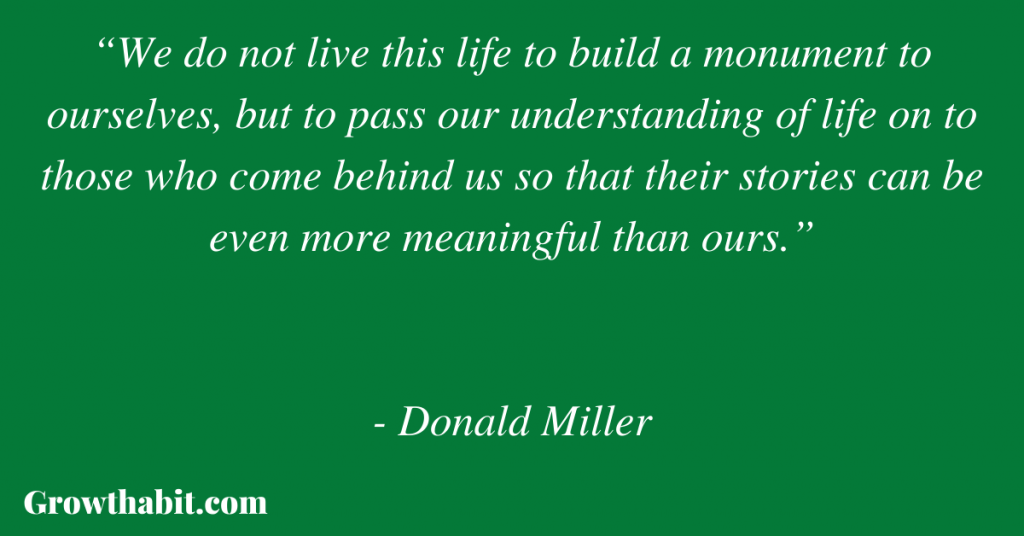
The main characteristic of a guide is that they help the hero win. That help must come from experience, and the most important experience they have to have had is in turning difficult situations into opportunities to transform.
We do not live this life to build a monument to ourselves, but to pass our understanding of life on to those who come behind us so that their stories can be even more meaningful than ours.
If life is teaching us anything, it seems to be this: it is a meaningful thing to sacrifice ourselves for the sake of another. This is the essence of a guide, and if we take the hero’s journey, this is where each of our stories will go.
2. A Hero Accepts Their Own Agency
[…] heroes are not as strong as you think. They are usually unwilling to act, in need of help, filled with self-doubt, and often incompetent in the very area in which they are given a challenge.
The heroic transformation begins when the hero takes responsibility for their life and for their story. The hero becomes the hero only when they decide to accept the facts of their life and respond with courage.
A person who does not believe they can control their life is a back-seat driver in their own skin, sliding around as “fate” blindly swerves off the road. They do not realize they are actually in the driver’s seat and can steer their life toward preferred outcomes.

To experience meaning, you have to accept the fact of your own agency and move into your life with intention. The point is that life feels like it has meaning if you structure your life so that you experience it.
3. A Hero Chooses a Life of Meaning
Meaning is something you experience while you are on an adventure.
We distract ourselves with pleasure when we can’t find a sense of meaning.
Frankl’s formula to experience a life of meaning was pragmatic and threefold: 1. Take action creating a work or performing a deed. 2. Experience something or encounter someone that you find captivating and that pulls you out of yourself. 3. Have an optimistic attitude toward the inevitable challenges and suffering you will experience in life.
The point is this: encounter something that pulls you out of yourself so that your world becomes larger.
[…] by creating something meaningful with our pain we begin the process of healing our wounds.
We must take the thing that has hurt us and shape it into an inner strength, perhaps even into a prevention of that thing ever happening again.
A victim wallows in their pain while a hero picks it up and turns it into something useful for themselves and others
We build lives of meaning by stating an ambition, by enduring challenges, and by sharing our lives with others.

At some point life takes the training wheels off and forces you to create a story that is better than the restless boredom that comes by trusting fate.
So how do we live a life of meaning?
Again: First we define an ambition. We choose something we want to bring into the world, or we join a community or movement that is bringing something into the world.
Second, we share our experience with others, and we allow ourselves to become interested in the people and beauty that exist outside ourselves.
And third, we accept challenges and even tragedies as a fact. Of course we try to prevent them, but we do not wallow in pity when they occur. Challenges are painful, but they can serve a purpose if we allow them to. I’ve come to think of this lifestyle as living as a hero on a mission.
4. What Elements Are Necessary for a Person to Transform?
Our pain and our challenges chisel us into better versions of ourselves. For sure, the blow of the chisel hurts. But the result, if we allow it to be, is a sculpted character competent to create a better world for themselves and others.
The hero must leave their comfortable life and pursue something risky. The hero has to want something, and she must take action to get it.
If we begin our day believing life is supposed to be easy, we will certainly have a terrible day. Life is not easy, nor was it ever supposed to be.
Life is often fun and entertaining, but that’s not the point of it. The point of life is to live a great story and experience meaning, and that often involves engaging challenges.
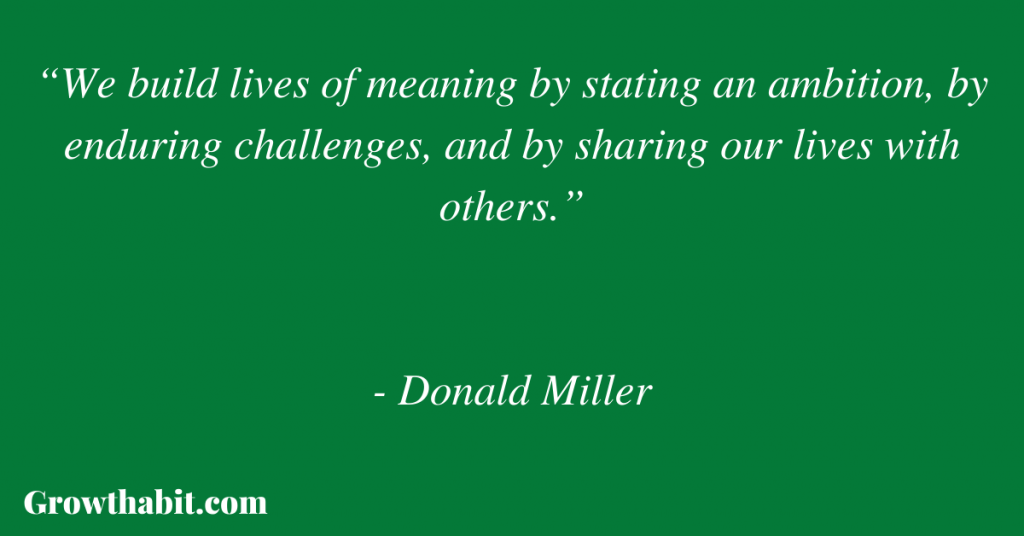
We have a responsibility to engage this world with courage. In many ways, engaging life with courage is our duty.
So how does a hero transform? They define a specific ambition for their lives, they engage challenges rather than avoid them, and they learn from their mistakes and misfortune
Change is caused by us wanting something and being willing to engage in the challenges of achieving what we want.
“What are you trying to build? What are you bringing into the world that wasn’t there before?” If they have a great answer to that question, and sometimes they do, I know I’m in the presence of a hero on a mission.
5. A Hero Knows What They Want
If you pay close attention to stories, you’ll find heroes to be incredibly flawed. They often have primitive desires and do selfish things. They are not always brave, and they do not always help the people around them. And yet, they try. They struggle with their base desires in order to become better. That’s why we fall in love with them.
The general rule is that a hero does not have to be perfect; they just have to consistently transform into a better version of themselves.
Don’t think you have to transform before you live a great story. Live a great story and the story itself will transform you.
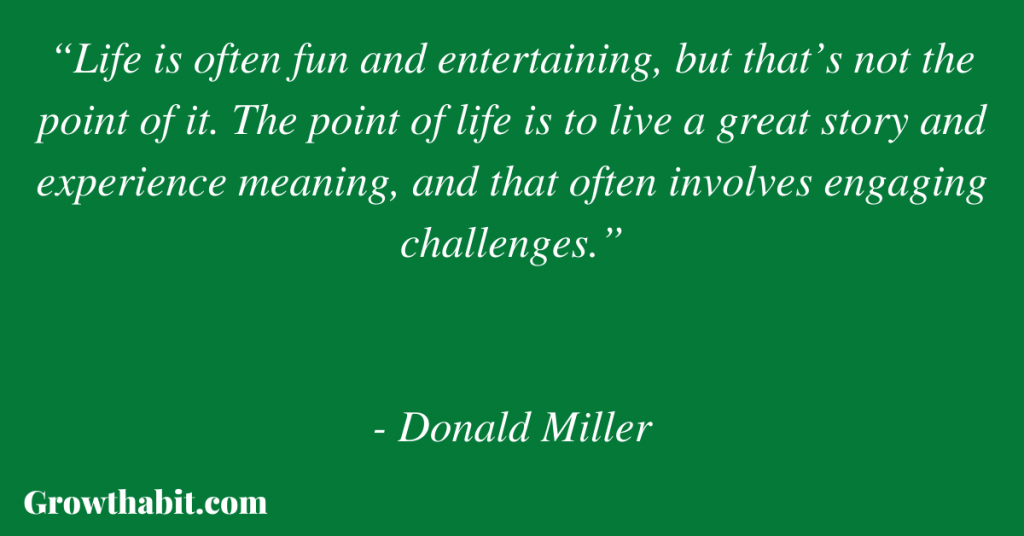
When you define a specific destination for your life, your story will begin to take shape and you’ll become more interested in your own life.
When you know what your life is about, and you know what you want to pursue, I assure you that you will get up early, you will swim across the river, you will walk through snow barefoot. Find the story you want to live and you won’t have to worry about discipline.
Andy Stanley says, “Your greatest contribution to the world may not be something you do but someone you raise.” I would add to that that the place you get the most meaning from life may not be in your accomplishments, but the necessary sacrifice you make on behalf of somebody else.
Meaning is centered in love: love for our projects, our world, our communities, and our families. We’ve got to find something that pulls us out of ourselves. When our babies cry in the night and we are tired and dragging and wonder if we have lost our freedom, the answer is yes. We have lost our freedom. But we have gained meaning. Meaning costs something.
The real question is: What are you endlessly curious about and does that curiosity draw you into a life of sacrifice? What will you give up your freedom to build?
More often than not, joining a mission is even more exciting than dreaming up one of your own. There is nothing like becoming part of a group of people who are changing their world.
6. A Morning Ritual to Guide and Direct Your Story
The hard thing about reading a book like this is that we get inspired and feel great about life, and then find ourselves right back in the sea of distractions. A year later, we sadly realize we haven’t moved forward on our story.
A professional writer knows their time is going to be attacked. They have to lock down the hours it takes to finish the book and then show up to work when they said they would show up to work.
Act 2: Create Your Life Plan
7. A Eulogy Allows You to Look Back on Your Entire Life, Even Before It’s Over
We come and we go and while it seems like we are here forever, forever is a perspective reserved for the young.
If we don’t remind ourselves of whom we want to be every day, distractions can steal our story.
Death is serving each of us, day after day. Again, the reality of death provides a ticking clock that clarifies our values and creates a sense of urgency.
8. A Good Eulogy Talks About Who and What the Hero Loved
A good story isn’t just about the hero. It’s about the people the hero loves, the people dependent on the hero, the victim the hero is going to rescue.
Stories may be told through the lens of the hero, but they are almost always about what is happening to a community of people.
When we perceive ourselves as weak and in need of a strong person to protect us, we are more likely to submit to a villain and serve them in order to associate with that strength.
Relationships, especially intimate and difficult ones, contribute to the quality of our stories and to the deep sense of meaning we are after.
Again, healthy relationships exist between people who find each other mutually beneficial. They are each strong in their own right, giving to the other out of their strength and generosity.
Heroes on a mission attract heroes on a mission. I want to do life with people who hunt meaning and share the hunt with their friends. And again, it’s not just people that we need in our lives. It’s art and nature.
9. A Good Eulogy Helps You Find Narrative Traction
To love people we must set them free to decide on their own accord whether they want to love us back.
To experience a great life and accomplish much, you just have to be willing to make a few people uncomfortable for a few minutes. Or maybe a few months.
If the vision you have for your life embarrasses you a little bit and makes you wonder if people are going to say, “Who do you think you are to want X?” then you’re on to a story that will gain you a little narrative traction and contribute to your sense of meaning.
There is no other way for a character to transform except to try to do things they didn’t know they were capable of doing.
10. Write Your Eulogy
When it comes time to make a good or bad decision, we will remember our story, the story we defined for ourselves, and we will ask ourselves whether the scene we’re about to live out belongs in the story or not.
11. Cast Your Long-Term and Short-Term Visions
The truth is, to live a good story we are going to have to make progress almost every day. Otherwise fate will take control.
In a way, every hero on a mission must transform into a fearless leader.
Equally as important as taking action is restraint.
When a hero lives into the challenge set before them, they begin to transform.
12. A Hero Gets Things Done
Whatever your goal, start a community that is focused on achieving that goal together. Find partners who will accomplish your goal with you, and you dramatically increase your chances of hitting that goal.
Heroes accept that things worth achieving require sacrifice. Victims, on the other hand, do not believe they have the ability to sacrifice because they are trapped and without power or agency.
The key is to make a daily sacrifice that, over time, will add up to significant progress.
13. The Hero on a Mission Daily Planner
If you try to write a book, you’ll probably fail. But if you enjoy writing every day, you’ll probably write several books.
If, every morning, we pretended today were the second time we got to live this day and we could learn from the mistakes we made the first time, we’d have much more clarity on things such as the time we wasted, the relational neglect we committed, and the financial mistakes we made.
14. The Role That Matters Most
Life requires experts. We need people around us who know what they are doing and can save us from our own mistakes.
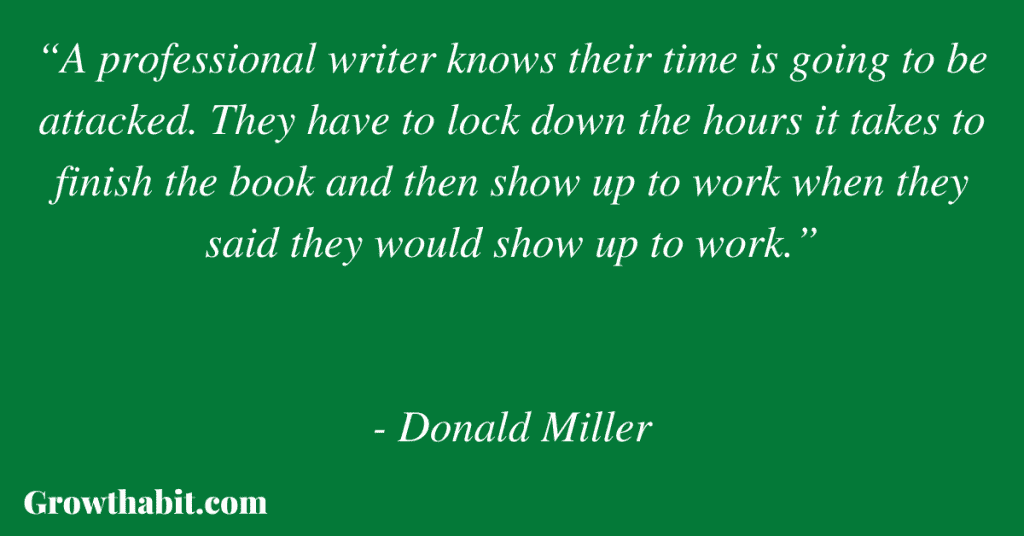
Mental, physical, and spiritual competence happens when we move into the challenges life offers us. Victims do not face these challenges because they cannot. Villains cause many of these challenges. Heroes walk into and through the challenges and are transformed in the process. Guides, then, teach heroes all they know about how to surmount the challenges.
Deciding where you are going in your life rather than allowing fate to dictate your direction is a characteristic of competence.
Knowing the difference between a primary task that must be achieved and a secondary task that should be ignored is a characteristic of competence.
Choosing to forgive requires emotional intelligence, which personifies competence.
Living in gratitude rather than wallowing in pity is a perspective that demands a control of one’s mind, another characteristic of competence.
Often, the people we most respect have been through what we are going through and survived. Guides teach heroes how they did it, and as such, generational wisdom is passed down.
15. The Story Goes On and On
Change, though, requires effort. In order to transform, we have to engage and perhaps even embrace the conflict that comes when we apply ourselves to a vision.
Act 3: Your Life Plan and Daily Planner
/
Book Review (Personal Opinion):
As a practical tool, this book was useful. In general, I enjoy Donald Miller’s ability to portray comforting scenes and describe simple things with admiration in his writing. The first act was excellent. I found it an extremely engaging and useful introduction to the roles people play and to the importance of living a meaningful life. However, after reading the first act, I had the impression that this is meant to be more of a guide for a daily planner tool than a standalone book.
Rating: 8/10
This Book Is For (Recommend):
- Anyone searching for a practical tool to enable personal growth and meaning in their lives
- Novelists looking for insights into their characters and better ways to structure their works
- Everyone who wishes to learn about the roles people play and to be the hero in their story
If You Want To Learn More
For insightful commentary about Donald Miller’s books, listen to his podcast Business Made Simple on Youtube.
How I’ve Implemented The Ideas From The Book
In act three of the book, I decided to give it a try and started filling out the daily planner. The process of reflecting on your goals and seeing yourself as a hero capable of changing your own life and the lives of others inspired me. However, it is too early to tell if it will work. There is certainly a lot of energy involved. I want to keep it going. Now I am looking for goal partners. If you’ve read the book or the quotes, you know what I mean.
One Small Actionable Step You Can Do
Give and you will get more, is a principle I believe in. It is called a “daily sacrifice” in this book. Choosing what you are willing to sacrifice today to get what you want is one step you can take to reach your goals. Would you consider giving up a cup of coffee or cutting a day or two from your next vacation to save money to implement your business idea? Rather than feeling stressed about a large sacrifice, it is better to think about how the small amount will add up over time. Ultimately, your goal should be to climb the ladder of determination every day rather than simply save money.
